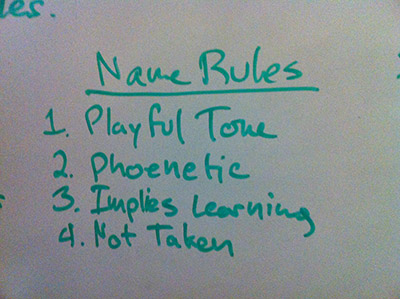Trending
Opinion: How will Project 2025 impact game developers?
The Heritage Foundation's manifesto for the possible next administration could do great harm to many, including large portions of the game development community.

Featured Blog | This community-written post highlights the best of what the game industry has to offer. Read more like it on the Game Developer Blogs or learn how to Submit Your Own Blog Post
I recently created a new game studio, and had to figure out what to call it. It wasn't an easy process, and I thought I would share some of the details.

The observation strikes me as funny: Almost anything you’d want to create in the 21st century starts with registering a domain name. But before you can register a domain, you need a name for this thing. Well, my thing was an indie game studio, and coming up with a name was not easy.

More specifically, it’s an educational games studio. My inspiration to create educational games, of a certain sort, was inspired by the book “The Diamond Age” by Neal Stephenson. Described in that book is an amazingly effective educational video game called ‘A Young Lady’s Illustrated Primer’ or just ‘The Primer’ for short. My ING savings account for starting a studio was called ‘Primer Fund.’ Unfortunately, when the time came, there was no way I could use the name ‘Primer,’ in any form, mostly out of deference to Primer Labs, creators of Code Hero (who, I happen to know, were inspired by the same book).
So, what to call an educational game studio? I started by putting together some portmanteaus of ‘Game’ and ‘Learning.’ Names like
Plearn
Playcademy
Luducation
Funstitute
Institute of Higher Gaming
etc.
On a gut aesthetic level, I didn’t like the direction I was headed (though, if you like any of these names, go ahead and use them). None of them seemed to trip off the tongue, and they all reminded me a bit of the buzzword Edu-tainment, which is a big turn off. It seemed like I was flying blind - I needed a plan. So, I came up with a set of criteria for determining whether something was a good name for my nascent studio.

Name Rules
Game Designers make rules, I guess.Very soon, #4 became my biggest problem. There are lots of good names for a game studio, but there are also lots of game studios. One of my favorite rejected names was Epicycle Games. I pictured a logo with a man riding a bicycle whose wheels had wheels. Turns out that name was already taken by the guys who made ‘Blindside,’ but who for some reason don’t own the .com? Get on it, guys.
It turns out there are a lot of things online that need checking:
Does someone own the .com? Are they actually using it or just squatting?
At my old job at Toy Studio, the CEO was willing and able to go chasing after domain owners and to negotiate inflated fees for their posession. At the moment, I am completely unwilling to spend my meager allowances of and time and money in this way. That meant I really had to come up with something unique.
Does someone have search priority?
I wanted my studio’s website to be the first google result for it’s name, even without doing any kind of SEO nonsense. This means that it can’t be a phrase that a very popular website has included somewhere, and it can’t be the ‘title’ of a website with a different url.
Does someone have the twitter handle?
This is a lot less important because the actual twitter handle and associated username need not be the same, but still might cause confusion - at least until the studio is influential enough that it gets verified by twitter.
I had a couple of choices lined up that might have fit these criteria, but after hemming and hawing for about 6 hours, and chatting with Chicago Game Dev friends, I settled on “Important Little Games.”
So far I’m very happy with the name. I get only positive remarks about it (though it would probably be a pretty dick move to say something negative right off the bat), and it’s met all my needs and expectations. There are only a few things it doesn’t address well, namely
It doesn’t necessarily imply games for learning
I think this is actually a blessing, in a way, because it gives the studio more flexibility. If the studio tacks a different direction we don’t have to change the name. On the other hand, there is the connotation of importance, which is related.
The twitter handle cannot exist
It turns out that @importantlittlegames is too long for twitter to accept as a handle, so I had to settle for @importantgames and hope that it doesn’t sound too pretentious without the ‘little.’
I think that these are an acceptable tradeoff.
The next stage was to figure out the logo. ‘Important Little Games’ doesn’t imply a lot of visual information to go on, so I was going almost from scratch. My first thought was to make an ‘important little guy’ like a general who tries to hide his gaming habit from his subordinates. While I still like the concept there, it wasn’t a succinct enough image to use for all the multifarious purposes that a company logo may be put to.

My favorite rejected concept was the silhouettes of a duck, another duck and a goose all in a row. Due to unfortunate anatomical similarities, people I showed this to thought that the ducks were goslings, or that the goose was a giant duck of some kind. Anyway, nobody got the joke. However, the idea of using a ‘little game’ to represent the company, and giving it some importance through form and presentation appealed to me, and I came up with this:

Rob Lockhart is Creative Director (and nearly everything else) of the 1-man studio ‘Important Little Games.’ You can follow him on twitter @bobbylox
EDIT: A great tool just game out for checking name availability and trying out some variations. Check it out here.
Read more about:
Featured BlogsYou May Also Like